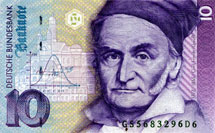

The German 10-Mark note (pre-Euro) featured Carl Friederich Gauß and his equation describing the “normal curve” of probability distribution.
QUOTES
Albert Einstein
If we knew what it was we were doing,
it would not be called research, would it?
Ian
Hacking
The taming of chance and the erosion of determinism constitute one of the
most revolutionary changes in the history of the human mind.
Stephen M. Stigler
One of the great mental experiments of all time.
Stephen M. Stigler
The advances in scientific logic that took place in statistics before 1900
were to be every bit as influential as those associated with the names Newton
and Darwin.
Theodore Porter
The study of statistics has reshaped much of social and natural science,
without drawing much attention to itself.
Gerrit
L. Verschuur
An adventure of discovery underlies all of science.
Max Planck
An important scientific innovation rarely makes its way by gradually winning
over and converting its opponents.
Mitchell Wilson
To the scientist, age comes as a surprise – a rather unfair surprise.
ARTICLES
The
Rise of Probabilistic and Statistical Thinking
Psychology, agronomy, medicine, and numerous other fields of study adopted probability
as a key tool for evaluating data. Most importantly, though, the rise of probabilistic
and statistical thinking forever changed the way humankind viewed knowledge.
(link)
A First Look at the Second Metamorphosis of Science
by E. Atlee Jackson
Over the past century the character and structure of science has been going
through a second process of fundamental change, with profound implications
concerning the future character of science. (abstract) (view/download full
text pdf)
Francis
Galton's Account of the Invention of Correlation
by Stephen M. Stigler
Galton's own 1890 account of the moment of discovery is discussed and contrasted
with Karl Pearson's widely known association of correlation with a retreat into
a recess at Naworth Castle. (full text online)
The Autonomy of Statistical Law
by Ian Hacking
The metaphysical revolution in which people became aware that law-like
indeterminism is at least thinkable. (full-text pdf)
Reflections on Revolutions
by S. L. Zabell
Review of The Probabilistic Revolution. The so-called probabilistic revolution
is difficult to attribute to any one group of individuals, affected a wide
range of fields, and took the better part of a century before it was in place.
(full text pdf)
The Ideological Immune System: Resistance to New Ideas in
Science
by Jay Stuart Snelson
J. S. Snelson discusses how our biological immune system protects our bodies
from an invasion of foreign agents and pathogens, and, in the context of
the historical discovery and treatment of malaria, how our ideological immune
system protects our minds from an invasion of foreign ideas and doctrines.
(full text online)
History of Statistics
A Brief History of Statistics and the Quincunx. (pdf)
On the origins of the .05 level of statistical significance
by Michael Cowles and Caroline Davis
Although Sir Ronald Fisher is responsible for the first formal statement
of the .05 criterion for statistical significance, the concept goes back
much further.
A Brief History of Statistics in Three and One-Half Chapters
by Stephen E. Fienberg
A review of seven recent books on the history of statistics from 1660 to
1950.
BOOKS
Experimentation
and measurement,
by W.J. Youden
One of the primary tasks of all explorers – and scientists are explorers – is
to prepare a map of an unknown region. Such a map will serve as a valuable guide
to all subsequent travelers. The measurements made by countless researchers have
been studied by mathematicians and much of the world of measurements has been
mapped out. (pdf)
VIDEOS
Knowledge or Certainty
In Part 11 of The Ascent of Man, Jacob Bronowski discusses the universal
uncertainty of scientific knowledge.
How Simple Ideas Lead to Scientific Discoveries
Adam Savage walks through two spectacular examples of profound scientific
discoveries that came from simple, creative methods anyone could have followed.
LINKS TO BOOK DESCRIPTIONS
From Certainty to Uncertainty: The Story of Science and Ideas
in the Twentieth Century
by F. David Peat
Science has shown us that knowledge will always be fundamentally
incomplete and that a true understanding of the world is ultimately beyond
our grasp. This new world view has had a profound effect not only on science,
but on art, literature, philosophy, and societal relations. The twenty-first
century now begins with a humble acceptance of uncertainty.
Merchants of Doubt
by Naomi Oreskes and Erik Conway
The ideology of free market fundamentalism, aided by a too-compliant media,
has skewed public understanding of some of the most pressing issues of
our era.
LINKS
Francis
Galton as Statistician
There are few aspects of modern social science that do not (or at least, should
not) rely on the statistical innovations that Galton introduced. "Kinship
and Correlation," published in the North American Review, 150, 419-431 (1890)
contains Galton's account of his invention of correlation.
Figures from the History of Probability and Statistics
Chronological descriptions of the greatest contributors to the field of probability
and statistics, from 1650 to the present.

